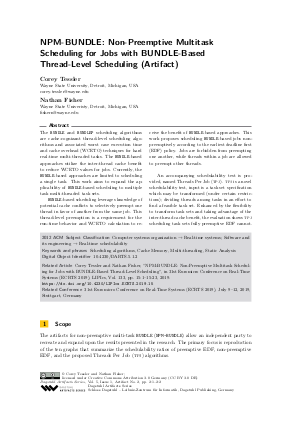NPM-BUNDLE: Non-Preemptive Multitask Scheduling for Jobs with BUNDLE-Based Thread-Level Scheduling (Artifact)
Authors Corey Tessler, Nathan Fisher
-
Part of:
Issue:
Special Issue of the 31st Euromicro Conference on Real-Time Systems (ECRTS 2019)
Part of: Volume: DARTS, Volume 5 (ECOOP 2019)
Part of: Conference: Euromicro Conference on Real-Time Systems (ECRTS)
Part of: Journal: Dagstuhl Artifacts Series (DARTS) - License:
 Creative Commons Attribution 3.0 Germany license
Creative Commons Attribution 3.0 Germany license
- Publication Date: 2019-07-08
Artifact Description

PDF
DARTS.5.1.2.pdf
- Filesize: 290 kB
- 2 pages
Document Identifiers
Subject Classification
ACM Subject Classification
- Computer systems organization → Real-time systems
- Software and its engineering → Real-time schedulability
Keywords
- Scheduling algorithms
- Cache Memory
- Multi-threading
- Static Analysis
Metrics
- Access Statistics
-
Total Accesses (updated on a weekly basis)
0Document
0Metadata
Artifact
DARTS-5-1-2-artifact-9b89f75e677bd37728faac2b920ae240.tgz
(Filesize: 5.39 GB)
MD5 Sum:
9b89f75e677bd37728faac2b920ae240
(Get MD5 Sum)
Abstract
The BUNDLE and BUNDLEP scheduling algorithms are cache-cognizant thread-level scheduling algorithms and associated worst case execution time and cache overhead (WCETO) techniques for hard real-time multi-threaded tasks. The BUNDLE-based approaches utilize the inter-thread cache benefit to reduce WCETO values for jobs. Currently, the BUNDLE-based approaches are limited to scheduling a single task. This work aims to expand the applicability of BUNDLE-based scheduling to multiple task multi-threaded task sets. BUNDLE-based scheduling leverages knowledge of potential cache conflicts to selectively preempt one thread in favor of another from the same job. This thread-level preemption is a requirement for the run-time behavior and WCETO calculation to receive the benefit of BUNDLE-based approaches. This work proposes scheduling BUNDLE-based jobs non-preemptively according to the earliest deadline first (EDF) policy. Jobs are forbidden from preempting one another, while threads within a job are allowed to preempt other threads. An accompanying schedulability test is provided, named Threads Per Job (TPJ). TPJ is a novel schedulability test, input is a task set specification which may be transformed (under certain restrictions); dividing threads among tasks in an effort to find a feasible task set. Enhanced by the flexibility to transform task sets and taking advantage of the inter-thread cache benefit, the evaluation shows TPJ scheduling task sets fully preemptive EDF cannot.
Cite As Get BibTex
Corey Tessler and Nathan Fisher. NPM-BUNDLE: Non-Preemptive Multitask Scheduling for Jobs with BUNDLE-Based Thread-Level Scheduling (Artifact). In Special Issue of the 31st Euromicro Conference on Real-Time Systems (ECRTS 2019). Dagstuhl Artifacts Series (DARTS), Volume 5, Issue 1, pp. 2:1-2:2, Schloss Dagstuhl – Leibniz-Zentrum für Informatik (2019)
https://doi.org/10.4230/DARTS.5.1.2
BibTex
@Article{tessler_et_al:DARTS.5.1.2,
author = {Tessler, Corey and Fisher, Nathan},
title = {{NPM-BUNDLE: Non-Preemptive Multitask Scheduling for Jobs with BUNDLE-Based Thread-Level Scheduling}},
pages = {2:1--2:2},
journal = {Dagstuhl Artifacts Series},
ISSN = {2509-8195},
year = {2019},
volume = {5},
number = {1},
editor = {Tessler, Corey and Fisher, Nathan},
publisher = {Schloss Dagstuhl -- Leibniz-Zentrum f{\"u}r Informatik},
address = {Dagstuhl, Germany},
URL = {https://drops.dagstuhl.de/entities/document/10.4230/DARTS.5.1.2},
URN = {urn:nbn:de:0030-drops-107306},
doi = {10.4230/DARTS.5.1.2},
annote = {Keywords: Scheduling algorithms, Cache Memory, Multi-threading, Static Analysis}
}
Author Details
Related Article
- Corey Tessler and Nathan Fisher, "NPM-BUNDLE: Non-Preemptive Multitask Scheduling for Jobs with BUNDLE-Based Thread-Level Scheduling", in 31st Euromicro Conference on Real-Time Systems (ECRTS 2019), LIPIcs, Vol. 133, pp. 15:1 - 15:23, 2019. https://dx.doi.org/10.4230/LIPIcs.ECRTS.2019.15
